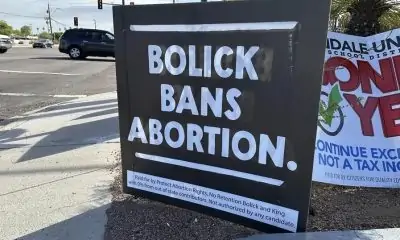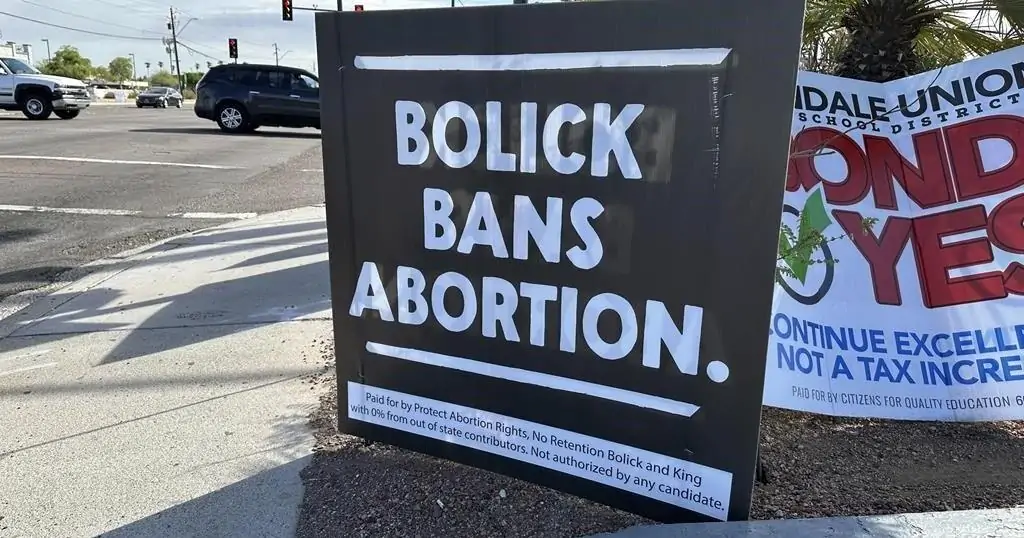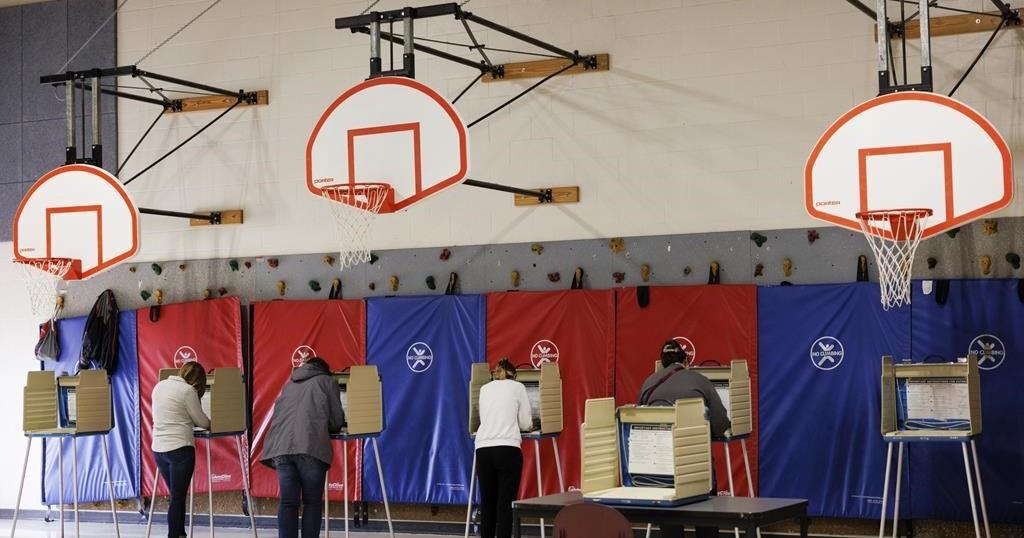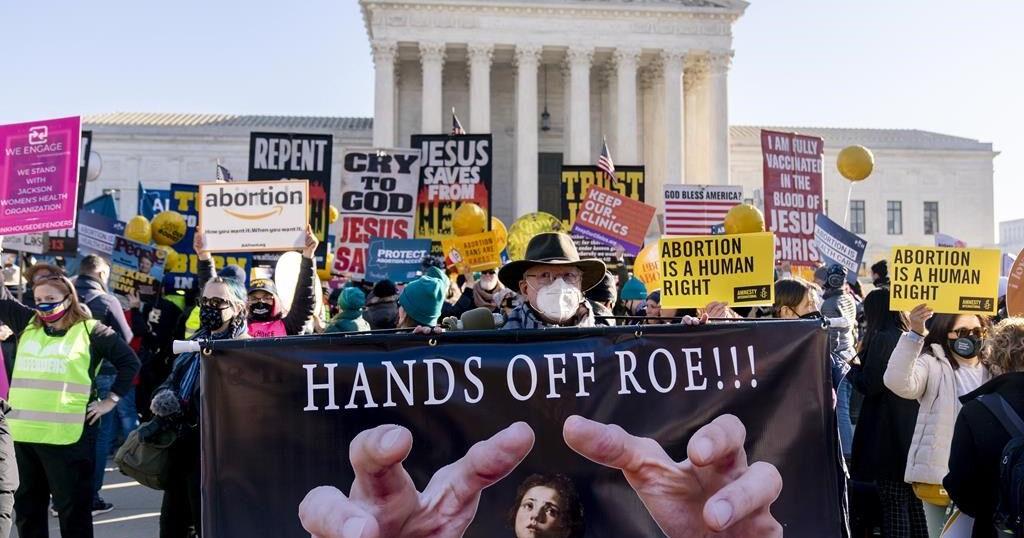WASHINGTON — Gretchen Whitmer, the Michigan governor and Joe Biden ally behind the effort to shut down Canada’s cross-border Line 5 pipeline, was re-elected Tuesday in midterm elections that showcased a surprising degree of Democratic resilience.
Whitmer narrowly bested Republican challenger Tudor Dixon, a steel-industry insider turned conservative commentator, in one of the only midterm electoral contests with direct implications for Canada-U.S. relations.
Dixon called Justin Trudeau “the most radical environmentalist in the entire world” as she attacked the Line 5 offensive in a debate last month with Whitmer, whose only defence was that plans to fortify the twin underwater lines were proceeding apace.
The Michigan battle was just one of 506 gubernatorial, House and Senate races that came to fruition Tuesday in a midterm showdown that pollsters and pundits expected to be a bruising indictment of Biden’s administration.
It wasn’t to be — at least not on the scale that Republicans had hoped.
They were on track to reclaim control of the House of Representatives, the one political prize that most observers were confident about, given the traditional pattern of midterm voters punishing the party that holds the White House.
“It is clear that we are going to take the House back,” said minority leader Kevin McCarthy, who is widely expected to take the speaker’s gavel away from Nancy Pelosi should that come to pass.
“You’re out late, but when you wake up tomorrow, we will be in the majority and Nancy Pelosi will be in the minority.”
Early on, Democrats managed to hold on to a pair of bellwether House seats in Virginia, a state where Republican Gov. Glenn Youngkin cruised to victory last year despite Biden’s convincing 10-point win there in 2020.
Then, Kathy Hochul triumphed in her bid for a first full term as New York governor, despite a robust Republican challenge. Soon, Donald Trump devotee Kari Lake — trailing in her bid to be Arizona governor — was already crying electoral foul.
And in Pennsylvania, Lt.-Gov. John Fetterman, sidelined for much of the summer with a stroke that impacted his speaking style and raised questions about his fitness for office, eked out a narrow but critical win over Dr. Mehmet Oz, another Trump acolyte.
“I’m not really sure what to say right now,” a visibly humbled Fetterman, clad in his trademark black hoodie, told supporters.
“This campaign has always been about fighting for everyone who’s ever been got knocked down that ever got back up.”
Whichever party ends up in control of Congress, Canada will endure in its relationship with the U.S., said Joel Sokolsky, a political science professor and foreign policy expert at Queen’s University in Kingston, Ont.
“There are very few issues in Canada-U.S. relations that the Congress seizes on specifically; usually, it’s a byproduct of something else,” Sokolsky said. Neither party is a stranger to protectionist sentiment, he added.
“Between the Democrats and Republicans in terms of America First, regarding manufacturing, I don’t think there’s that much difference.”
One key foreign-policy question for Canada — maintaining the international coalition of support for Ukraine in its war with Russia — is likely safe, since Republicans have already signalled they have no interest in undermining it, Sokolsky said.
“I think in terms of broader issues — Ukraine, the broader NATO alliance — I don’t think it’s going to make that much of a difference who is in control of Congress.”
While Whitmer’s effort to shut down Line 5, fearing an environmental disaster where the twin pipelines cross the Great Lakes, will persist, Republican influence on Capitol Hill could create fresh pressure in both countries to ramp up energy efforts.
“I think a big part of the narrative, if the Democrats ultimately do end up losing the House, will be that it had to do with gas prices,” said Eric Miller, a Canada-U.S. expert and president of the D.C.-based Rideau Potomac Strategy Group.
“I do think that they will be more pressure on the federal government to step up its activities on the fossil energy front.”
In Arizona, a problem with voting tabulation machines promptly fuelled charges of electoral tampering, led by Trump on social media and seized upon by Lake as she urged supporters not to give up the fight.
Officials insisted the problems with the machines did not prevent anyone from voting, but that did not prevent Lake from insisting otherwise.
“When we win, first line of action is to restore honesty to Arizona elections,” she told supporters as she trailed Democrat Katie Hobbs, the secretary of state, by a margin of 12 percentage points with half of the polls reporting.
“When we win — and I think it will be within hours — we will declare victory and we will get to work turning this around — no more incompetency and no more corruption in Arizona elections.”
Neck-and-neck races in battleground states had all but ensured that the question of whether Republicans could wrest control of the upper chamber away from Democrats would not be resolved right away.
In Ohio, venture capitalist and “Hillbilly Elegy” author J.D. Vance — another Republican with Trump’s seal of approval — soundly defeated congressman Tim Ryan, a Democrat who had tried to distance himself from President Joe Biden.
And in Wisconsin, Republican incumbent Ron Johnson was nursing a one-point lead over Democrat Mandela Barnes with just over 90 per cent of the vote counted.
That, combined with Fetterman’s win, shifted the focus to Georgia, where former NFL running back Herschel Walker and Democratic incumbent Raphael Warnock spent the entire night swapping a narrow lead.
With 95 per cent of the votes in, Warnock was leading Walker by a scant 35,000 votes, but remained half a percentage point shy of the critical 50 per cent threshold necessary to avoid doing it all over again in a runoff next month.
“We’re not sure if this journey is over tonight, or if there’s still a little work yet to do,” Warnock told his supporters.
“Here’s what we do know: we know that when they’re finished counting the votes from today’s election, we’re going to have received more votes than my opponent.”
However it turns out, Canada and the United States will remain important economic partners who will work together for the mutual benefit of people on both sides of the border, Prime Minister Justin Trudeau said earlier in the day.
“We have worked through very different configurations of administrations in the past,” Trudeau said when asked about the potential fallout.
“The friendship and the solidity of the relationship between Canada and the United States will continue, regardless of whatever happens in the midterms.”
Midterm elections are rarely a cakewalk for the party that controls the White House, but stubborn inflation, economic anxiety and President Joe Biden’s dismal approval ratings have been rocket fuel for Republicans.
In Arizona’s Senate race, Sen. Mark Kelly was enjoying a comfortable lead over GOP hopeful Blake Masters with 50 per cent of the vote counted. Next door in Nevada, early counts showed Democratic Sen. Catherine Cortez-Masto out in front of rival Adam Laxalt.
And in Massachusetts, voters made history by making Attorney General Maura Healey not only their first female governor, but also one of the first openly lesbian governors in the U.S.
In the least surprising result of the night, Florida Gov. Ron DeSantis, widely expected to challenge Donald Trump for the Republican nomination for president in 2024, handily fended off Democratic rival Charlie Crist.
The convincing win by DeSantis, christened “DeSanctimonious” by Trump during a rally last week in Pennsylvania, is sure to fortify expectations that he’ll challenge the former president for the chance to win the White House in two years’ time.
This report by The Canadian Press was first published Nov. 8, 2022.
James McCarten, The Canadian Press
Related


































